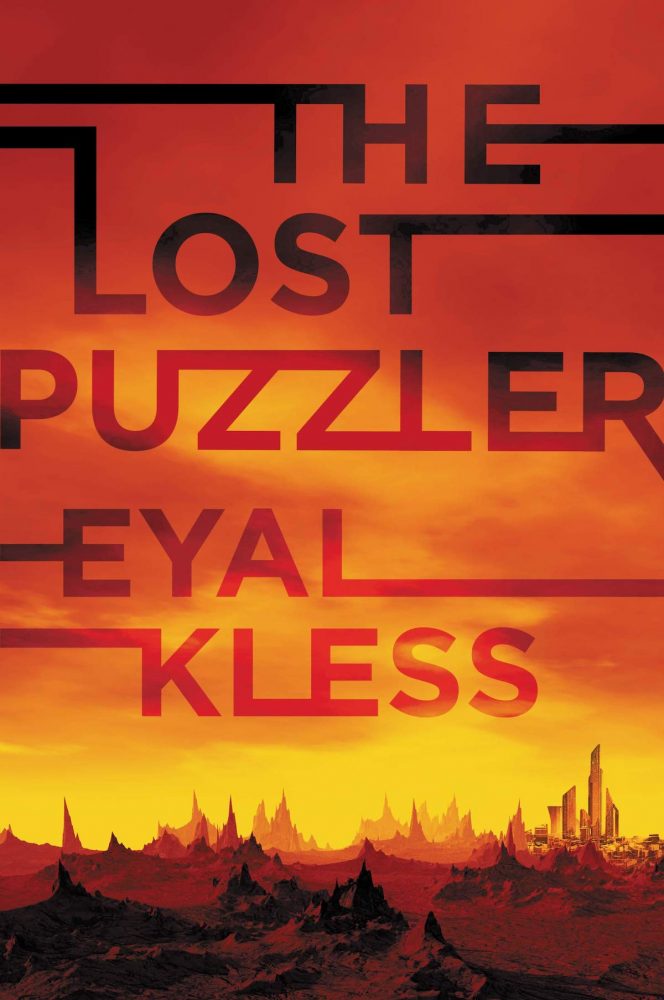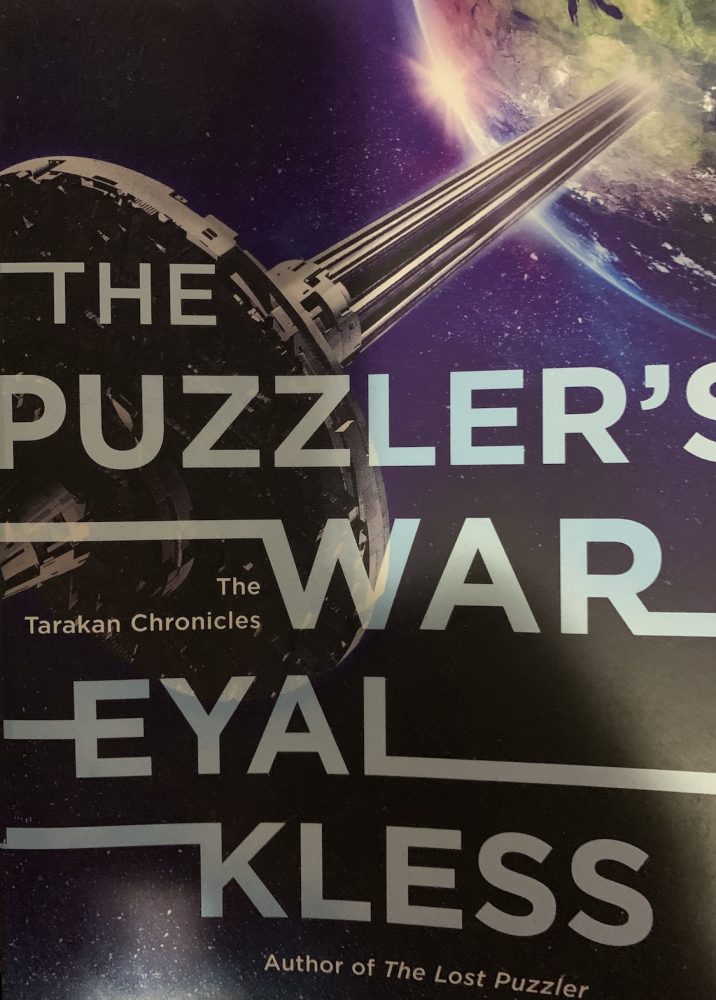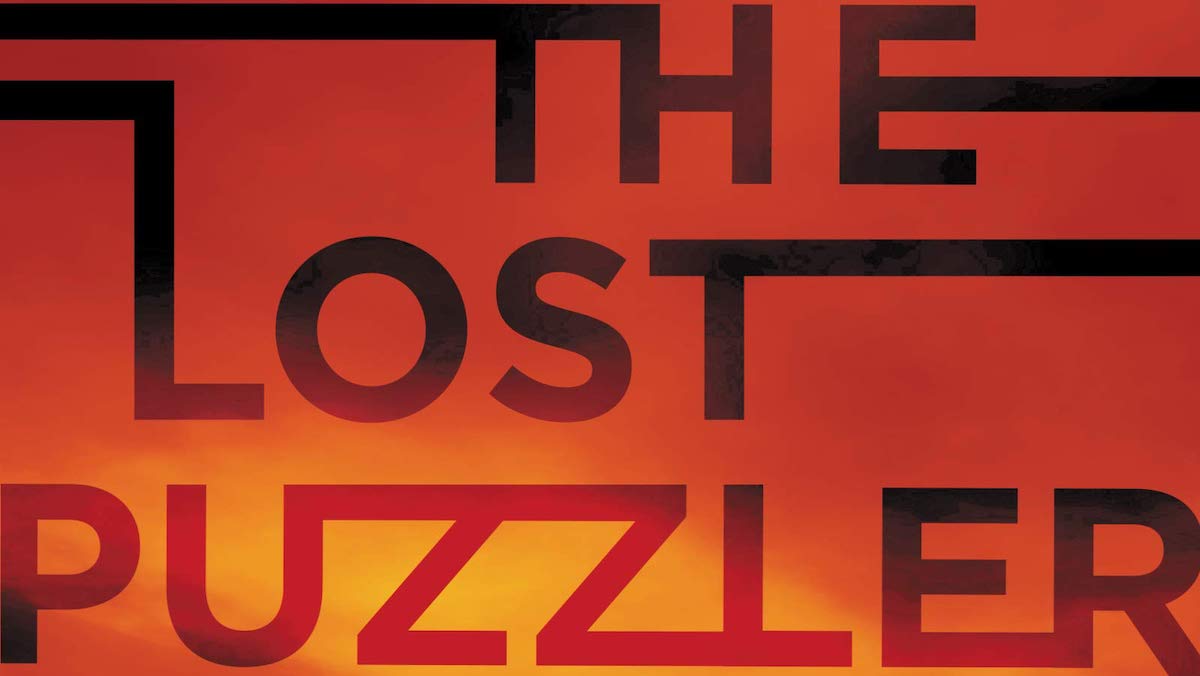
The world of the Tarakan Chronicles, in The Lost Puzzler and The Puzzler’s War by Eyal Kless, is one of bleak uncertainty.
The only surety for everyone is that things once used to be much better. Society has devolved to one of limited resources. Farming communities have formed and would thrive, save they’re at risk of attack from raiders. Cities are still occupied, with all that entails, but order is hard to find, and everyone is out for themselves.
Monster trucks still drive the highways but they’re unreliable and also subject to pirate attacks.
The Holy Grail of Tarakan Chronicles is those prized bits of technology left by those who once ruled the world. That technology can only be accessed by those called “puzzlers,” people who are born with nanotechnology that allows them to see the patterns left by those who created the great civilization. The two main characters of the books, Rafik and the man called Twinkle Eyes, aren’t after those riches, however.
They’re after knowledge. And, in a form, they get both.
The Lost Puzzler and The Puzzler’s War are dense books, in the best sense, because this world is so dense and rich. Every journey from place to place is another revelation. Every character adds their understanding of what happened or what’s going to happen.
I wouldn’t exactly call the series “grimdark” but it’s certainly a bleak world, though levened by humor and the survival of a few favorite characters. What I loved most about this series is that it never follows a predictable pattern. All the plot twists make sense in retrospect, as do all the character choices, but not in ways that I ever expected. The Tarakan Chronicles is the type of story that can be read over and over, with the reader finding something new each time.
The series is one of my favorite pure SF series in a long time. I compare it favorably, in themes, to the television show Person of Interest, though that world isn’t a dystopia. Yet.
Kless, a violnist as well as an author (and admitted fan of Dungeons & Dragons), talked of journeys, endings, and how he created the world of the Tarakan Chronicles in an interview last week:
GeekMom: In the Lost Puzzler, Rafik goes on a type of quest, even if it’s not of his own choice. Do you think he was driven more by survival, the need for answers, or for the compulsion related to his puzzler’s abilities?
Eyal Kless: I envisioned Rafik as a victim of circumstances. Powerless as well as ignorant about his abilities and what they mean. Rafik is caught in a whirlwind of powerful forces that sweeps him away from everything he knows, loves and cherish. Slowly. With the help of the enigmatic dreams, Rafik takes control of himself and also his life. The reason he is so drawn and driven can be partially explained in psychological terms, but also there is a more “solid” reason for so eagerly risking his life to get to Tarakan Valley. This very reason is explained in The Puzzler’s War.
GM: You have traveled around the world. Rafik certainly takes a journey around his world. How much of your own travels influenced the world of the Tarakan Chronicles?
EK: I have been blessed with my career as a musician to have traveled quite extensively and even better, I have met and interacted with people from more foreign places that I had visited. People are essentially the same all over the world. They have the same fears and the same wants. They love their children and are only open to strangers if they feel safe themselves (this is why hate politicians always preach that the very “way of life” of their people is endangered.)
I haven’t been to any exotic places; I keep those for my imagination.
GM: Was there any particular book or movie or your own ability with music that led you to create your world or influenced it?
EK: The idea began forming in my head when I got my first cellular phone, back in the 90’s. It was a primitive machine but it got me thinking about how I would be able to show others how to use it, but would not know how to fix it if it broke down.
And so I envisioned what it would be like if the whole society would be like that. It took a lot of time but everything fell into place. Of course, some movies and books were an influence, A Canticle for Leibowitz by Walter M. Miller Jr. was one of the first post dystopian books I read as a kid and the idea that monks would labor their their lives painting and coping blueprints (by drawing the blue bits and leaving the white) without knowing what those blueprints are for, made a huge impression.
In retrospect, Mad Max and the Terminator franchises were also an influence as well as the Badlands computer game. My experience and love for classical music is definitely mentioned and at least one minor character’s name is a wink at my fellow violinists, but I do not think it was essential for the story.
GM: Did you create the dystopia of the Tarakan Chronicles piece by piece, as Rafik discovered the world around him or was it more of a world-first, and then characters were placed into it?
EK: It was somehow all connected. When I write, I do tend to see the world first but without a strong story line and captivating protagonists it Is just an empty shell. That said, the process was not as meticulous as perhaps it should have been. I am not the kind of writer that completes a full story arc before actually setting to work (oh, how I envy those authors!), on the contrary, I just began scribbling down “scenes” I would like to “see”, like the SuperTruck battle and the meeting with Nakamura, the hideous self-proclaimed Oracle, then the storyline kind of twists and moves on its own accord and takes shape.
GM: In both books, there’s a sense of desperation that drives all the characters but there’s also a sense that just, maybe, against the odds, they might somehow win. Call it a tiny bit of optimism in the face of overwhelming pessimism. Did you consciously set out with that tone in mind or did it develop as the story did?
EK: I knew the story would be bleak, but I was surprised how many times the story took me towards the darkened path, especially with several scenes which ended up darker than I expected, such as the terrible moment between Rafik and his father after his malady was discovered.
(I wrote the first novel sitting at nights next to my sleeping daughter and I had to move to another room as I worked on this scene). Yet I am an optimist in real life, and I just could not write a story that was all death and destruction. What’s the point, really? We need hope and light in our life (and video games, we really need them.)

GM: In the Puzzler’s War, you use Mannes to explore the history of how the world became a dystopia, and how the character himself seems to descend into madness. Basically, Mannes does horrible things for what he feels is the right reason. Do you see him as a villain, a survivor, or madmen or all three?
EK: Mannes is such a great character but even now, I still am not sure what I feel about him. I wanted to make him an arch villain, a proper monster, after all, he is a mass murderer, but I also wanted people to stop and ask themselves “what would I have done in his place?” I wanted readers to despise Mannes for what he became but to slowly grow to understand the tough circumstances he found himself in.
Many of Mannes’s actions are motivated by reason and are still on the shady side of the moral scales, while other actions are emotional, so very human and wrong at the same time. He had committed atrocities but I think readers would pause when they encounter them and perhaps say to themselves, ‘that’s awful, and I would never do this myself, but I understand why he did it.’
I keep asking myself, what would I have done in his stead, how far would I have gone?
Essentially, with Mannes, as with Vincha, the whole story revolves around the idea of parental love, and how far would you go to protect your child. The automatic answer of any normal parent would be “everything, anything” but that answer could lead to a very dark tale.
GM: What’s next for the Tarakan Chronicles? Where do you see the story going?
EK: When I set out to write The Lost Puzzler, I never dreamed it would be published. I just wanted to write the story that was playing in my mind and keeping me awake at nights (a sort of exorcism, if you get my drift). When Harper Collins Voyager bought it on a two-book deal, well, that was just insane. I was terrified that the sequel, The Puzzler’s War, would not stand up to the original novel, but I am incredibly happy and embarrassingly proud with the outcome.
I think The Puzzler’s War ends perfectly in the sense that the world described in the chronicles changes dramatically, but perhaps not for the better. It is not an optimistic, rosy, all-will-be -well ending but it is not a pessimistic doom-n-gloom either. The enigmas set in the beginning of The Lost Puzzler are solved and I did my best for the reader to be left with a sense that he/she understands the world and the story lines within it. So, in many ways, it could be left there.
Thing is…I’ll miss Twinkle Eyes and Vincha and boy, I am gonna miss Galinak sooo much (As if reading my mind, Michael David Axtell gave Galinak the best Scottish accent in the audio book!), but I guess a third Tarakan novel really depends on the fans.
A third book might be a continuation of these two (“Tarakan Origins” comes to mind, and I did write some ideas down) or a standalone novel with a different set of protagonists (something with SuperTrucks in it, for sure!). It really depends on how things play out, that’s the short answer…
In the meantime, I completed a crime/suspense novel set in near future Israel, and also working on a comic-fantasy book and a novel called Harsh Dreams AND I am involved in turning my first Israeli Novel, Rocca’s Violin, into a screen play. I have my hands full, but Tarakan is never far from my mind.
You can find Kless at his website, where you can also subscribe to his newsletter.
Disclaimer: Harper Voyager provided a review copy of The Puzzler’s War.




